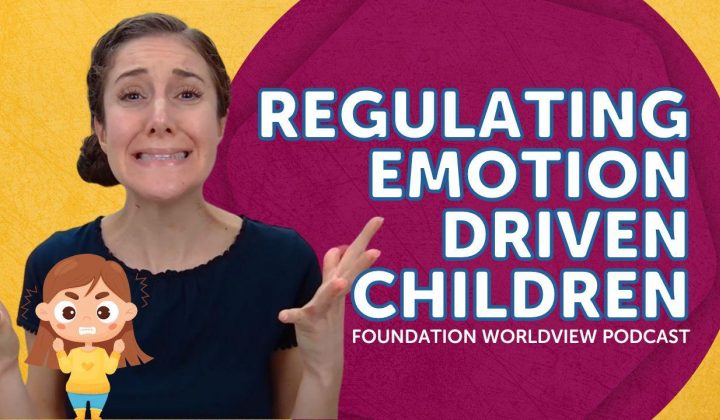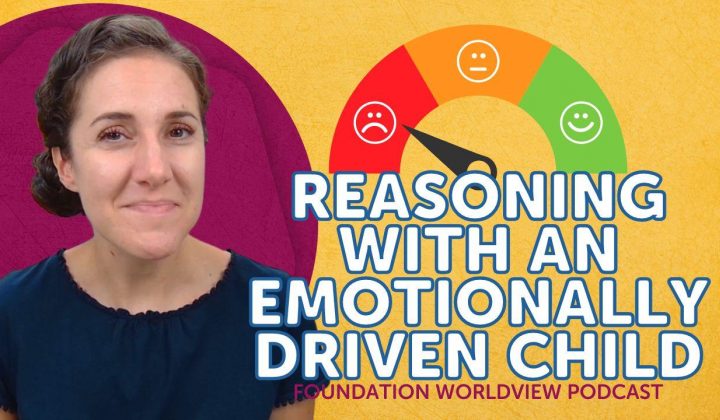Learn more about the journey that led to us equipping kids to carefully evaluate every idea they encounter.
Meet members of our team who have contributed to curriculum development.
Hear from real users of the Foundation Curriculum.
Learn what we believe about God, Jesus, Scripture, and more.
Believing but Not Obeying the Bible
In today's episode, host Elizabeth Urbanowicz tackles a question many parents and guardians grapple with: What does one do with a child who professes belief in the Bible but hesitates to obey its teachings? Diving deep into the nuanced dynamics of stated belief versus actual practice, Elizabeth offers a perspective that calls attention to the heart's truest intentions. Drawing from personal experiences, she underscores the significance of confession, repentance, and prayer. Whether you're a parent, mentor, or guardian, this episode offers insights into nurturing a child's spiritual growth. Don't forget to subscribe, share, and join us in equipping future generations with a biblical worldview.
Transcript
Note: The following is an auto-transcript of the podcast recording.
Hello friends, and welcome to another episode of the Foundation Worldview Podcast where we seek to answer your questions so that you can equip the children that God has placed in your care to carefully evaluate every idea they encounter and understand the truth of the biblical worldview. I'm your host, Elizabeth Urbanowicz, and I'm thrilled that you've joined me for another episode today. Today's question says, "what does one do with a child who believes the Bible but still doesn't find it necessary to obey it?" A very interesting question for us to think through.
But before we do that, I would ask that if you have found the content of this podcast beneficial that you would like and subscribe to make sure that you never miss any future episodes, and also ask that you would consider writing a review and sharing this content with those within your sphere of influence so that we can equip as many adults as possible to get the kids in our care to understand the truth of the biblical worldview. Also, if you have a question that you would like for me to answer on a future Foundation Worldview podcast, you can submit that by going to FoundationWorldview.com/podcast.
Now, this question is a very interesting one with a child who claims to believe the Bible but still doesn't find it necessary to obey it. I'm sure that applies to some adults as well. And when I read this question, the first thing that I thought of is a statement that my pastor regularly says during sermons, and he says that stated belief plus actual practice equals actual belief. So stated belief plus actual practice equals actual belief. So we can claim that we believe something, but what we do is the proof of whether or not we actually believe that thing is true. So anyone who claims to believe that the Bible is true but does not find it necessary to obey the Bible, that person doesn't actually believe that the Bible is true.
So if our children claim to believe the Bible, but they don't find it necessary to follow what the Bible says, they don't actually believe the Bible. Jesus is very clear. In John 14 verse 15. He says, if you love me, you'll keep my commandments. That if we actually believe that Jesus is the Son of God and that he's the only way to God and that we need to be reconciled to him, and if we have turned from our sins and trusted in him, we prove that we love him by obeying his commands.
Now, not finding it necessary to obey the Bible or obey Jesus's commands is different than someone falling into sin and repenting that the New Testament is clear that we all still wrestle with the flesh and we will, until Jesus calls us home or until he returns, that the process of sanctification will not be complete until we are in eternity with Jesus.
So Christians will fall into sin, but then we're called to repent, to turn from that sin and to trust in Jesus for the forgiveness of that sin. Now, that is very different than someone who just has no regard for God's commands, feels no guilt over disobeying those commands, and honestly has no love for Jesus because they have no desire to keep his commands.
Now, when this is the case, this is an issue of the heart. It's not necessarily an intellectual issue because if the person is claiming that they believe the Bible is true and they think intellectually the things claimed in the Bible are true, but they have no desire to follow God or his ways, that is an issue of the heart and only God can turn a heart of stone into a heart of flesh, only God can do that. So the most important thing for us to do in a situation like this is to pray because God is the only one who can do what we cannot.
We cannot change our children's hearts. We can do things to try to cultivate the affections of their hearts, but we cannot change their hearts. Only Jesus can make dead people live again, only he can turn a heart of stone and turn it into, take a heart of stone and turn it into a heart, a flesh. And so in this case, we need to pray for our child. We need to lay them before the Lord and say, "God, they claim to believe these things, but it's very clear that they don't because of how they are living, like I can correct them, I can discipline them, I can point them towards you, but I ultimately cannot change their heart. Please soften their heart towards you. Please give them a heart that feels the weight of their sin and repents of that sin and turns from that sin and trust in you alone." Because God can do what we cannot do.
Now, I saw this in somewhat of a different situation in my life, but there was a situation that I was walking through in my mid twenties where someone who was very close to me actually betrayed me. And not only did they betray me, but they started telling lies about me to those in my church family, to those in my family, to my friends. And this person was a very winsome person. And because of that, there were many people who I was close to who actually believed these lies about me. And even when I would go to defend myself and say, "no, this is not what happened, you don't understand this is the truth of what happened." Some of those people still wouldn't believe me. And someone in my life, one of my mentors who is discipling me, said, Elizabeth, you cannot change these people's hearts.
Their hearts are with this person who betrayed you. And so their minds are convinced that what he said is true. And so you need to allow God to be your defender and pray and ask that in his timing that he would let the truth be known. And that was so hard for me. I just wanted to take people by the shoulders and shake them and say, you know me, I wouldn't do this. You know that I wouldn't actually do this thing that this person is claiming that I did. It's not true. Let me show you the evidence. But even when I had done that, no one believed me.
So I laid it before the Lord. I said, okay, God, I trust you. Only you can change these people's hearts. Only you can really reveal the truth to them in a really big way. And it took almost a year, but almost a year later, several of those people, one by one came to me and they apologized and they said, "I had no idea. I was so blind. But then these situations came up and God just made it clear that you were wronged, that you were not in the wrong, but you were the victim here." And so God can do what we cannot do. So we really need to lay this at his feet, pray for our children.
Another thing that we can do as we're praying is put rhythms and routines in place that can help foster the softening of a heart. Now remember, we can't soften a heart, but we can put rhythms and routines in place that can lead our children to this place. One of the most important things that we can do when we're talking about working with a hardhearted child is making sure that we are confessing and repenting of our sin when we sin against this child, because that's going to demonstrate humility on our part and for us to model for them what they really need to do.
And not that we're supposed to fabricate something that we did so that we can model confession and repentance. No, but when we genuinely sin against them, going to them confessing that sin, repenting of it, and asking for their forgiveness, and now this is important even in sins that we have committed long ago that we have not repented of because that still hinders our relationship with this child.
This is another thing that I saw in my own life. One year I was teaching and I had a group of students that was very, very spiritually sensitive, and I was praying through what I could do just to really continue to help them grow in ways that I hadn't helped other students in the past grow. And so one idea that I had is I held a Thursday afternoon lunch book club. And so any students that wanted to, they could come to our classroom or stay in our classroom for lunch, and I would read them a chapter from a book, and then we'd discuss it and we'd talk about different things that we could put into practice in our own lives from the book.
And one of the books that I read to my students was called Making Brothers and Sisters Best Friends. And in that book, one of the chapters was talking about confession and repentance and how when we sin against our siblings, we tend to think if we do nice things, it'll go away, or if we just wait long enough, they'll forget about it. But even if it's something that we've done to sin against them, that was years ago, we need to go and we need to confess and repent of it. And so I talked about that with my students. And then one thing I was convicted of is I was asking them to go and do this with their siblings when I knew that was something I had never done with my siblings.
And at the time, I didn't have a close relationship with either of my siblings. We liked one another, but we never talked on the phone. We'd never get together. We just weren't close. And so I thought, oh my goodness, am I really going to do this? At the time, I think I was 26 or 27, and I thought, I haven't lived at home in my parents' house for 10 years. These things I'm going to be confessing or repenting of, are 10, 20, 25 years old should I really do this? But I just really sensed that I needed to do this because this is what I was asking my students to do. So that weekend I got together with my brother, he lived in the area, and I just said, Hey, there was these ways when we were growing up where I didn't treat you fairly. And I just brought up specific examples of things that I did and I asked him to forgive me.
And that was a real turning point in my relationship with him. And same with my sister. At the time I was teaching to set side of Chicago. My sister was a student at Taylor University in Indiana. So two weekends after that, I asked my sister if I could come visit her, and I went down and I visited her for the first time actually down there. And one afternoon when I was down there, I did the same thing. I said, Hey, when we were growing up, there were these ways in which I didn't treat you right. And I gave specific examples and asked her to forgive me. And that was also a turning point in my relationship with my sister.
It wasn't an immediate thing where we became best friends or anything, but it was a significant turning point. And after that, we became close. And when she got married, she asked me to be the maid of honor in her wedding. And even today, she works part-time for Foundation Worldview. So we're daily working together. And so that confession and repentance was necessary on my part, even if it was regarding sins. I had committed 20 years in the past that those sins needed to be confessed and repented of before I could have a genuine relationship with my siblings.
So we need to make sure with the kids in our care that we're doing the same thing, that if we have sinned against them in ways in the past that we haven't confessed and repented of that, we need to do that to confess and repent so that we can continue building relationship with them and continue building relationship not only through confession and repentance, but through spending time with them, through getting to know them, through getting to learn what things they enjoy and participate in those things that they enjoy. We need to make sure we have a strong, healthy relationship with them.
Also, making sure that in our home, we're requiring practices that honor God, such as daily Bible reading and prayer, serving the body of Christ, serving in our community. We need to make sure that we have these things set up in place in our home, that even if our children have hard hearts towards them, they're things that could foster a softening of their heart.
And then again, just circle back to the praying that this is an issue. Only God can soften the heart of a child and bring them from a place of unbelief to belief in Him. So pray, pray, pray, pray, pray.
Well, that's a wrap for this episode. But as always, as we leave this time together, my prayer for you is that no matter the situation which you and the children in your care find yourselves, you would trust that God is working all things together for your good by using those things to conform you more into the image of His Son. I'll see you next time.
Related Posts and insights

Regulating Emotion Driven Children
Today's question says, "When raising emotional kids, how do you teach your children how to not only recognize their emotions, but practically manage them in a biblical way, upholding the biblical virtue of self-control?"

Reasoning with an Emotionally Driven Child
In this episode, Elizabeth Urbanowicz explores how to reason for the faith with a child who tends to be driven by their emotions or feelings. We'll look at helping them understand the concept of truth, how to discern it, and ultimately checking if their emotions or feelings towards something aligns with what is true.

Teaching Our Kids About Using Emotions and Discernment
Our children will repeatedly encounter this idea that their feelings are the most reliable guide for truth. How can we equip them to rightly recognize their emotions, without being led by them? Here are a couple of ways we can intentionally prepare our children to make decisions based on discernment rather than pure emotion.





